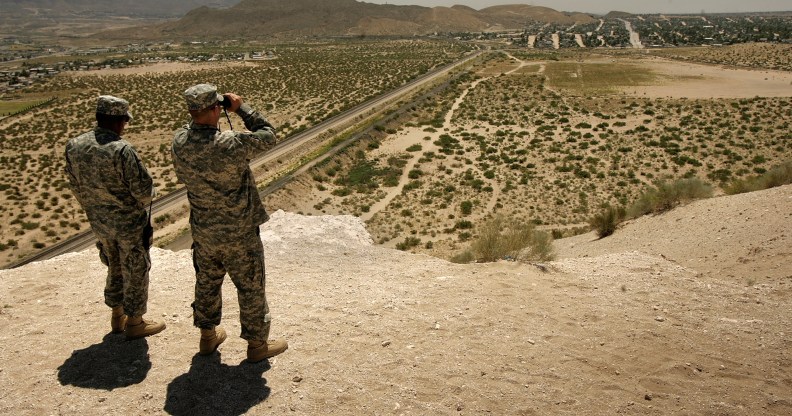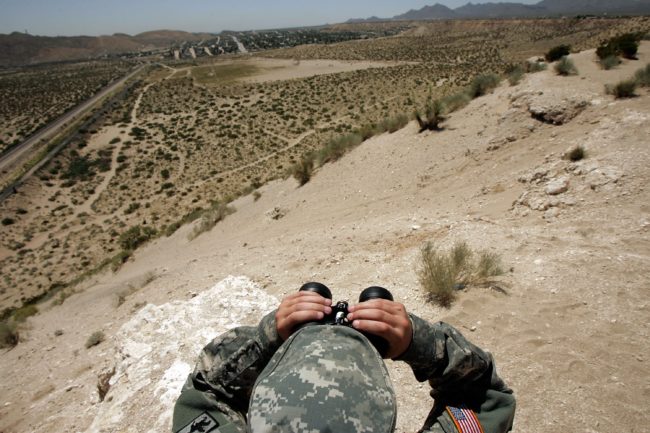State National Guards defy Trump on transgender military ban

New Mexico National Guard officers near the US-Mexico border on June 26, 2007 in Sunland Park, New Mexico. (Chip Somodevilla/Getty)
National Guards in at least five states will continue to welcome trans troops, despite the Trump administration’s transgender military ban coming into effect.
The Trump administration rule that bans transgender people from serving in the armed forces went into effect on April 12.
However, a number of states have signalled that they will not extend discriminatory policies to their National Guard, which is one of the few parts of the armed forces not under direct federal control.
The southern border states of California, Nevada and New Mexico have all signalled that trans troops are still welcome, alongside Oregon and Washington state.
States will not ban trans troops from National Guard
A spokesperson for New Mexico governor Michelle Lujan Grisham told Kob4: “We are not going to discharge any transgender individual from serving in our state National Guard, nor would this state ever discriminate against someone based on their gender identity
“The capacity to do the job effectively is the first and only consideration New Mexico will make in determining who serves in its National Guard.”
Oregon governor Kate Brown, who is bisexual, confirmed to The Daily Beast: “[I am] appalled that the Supreme Court is delivering an intentional blow to civil rights by supporting a push from the Trump Administration to bar transgender people from serving in the military.
“I will use every option available to ensure that every eligible Oregonian, regardless of gender identity, can serve their state and country.”

National Guard officers near the US-Mexico border on June 26, 2007 in Sunland Park, New Mexico. (Chip Somodevilla/Getty)
Major General Matthew Beevers of California National Guard told The Hill: “Every [transgender] soldier or airmen currently serving in the California National Guard will remain in our ranks. We will not treat any soldier or airmen any differently today, than we did yesterday.”
The general added that the guard “will explore every avenue to ensure that [transgender] people who want to serve in the California National Guard are afforded every opportunity to serve.”
A spokesperson for Nevada governor Steve Sisolak told The Daily Beast: “The State of Nevada does not discriminate against anyone, including and especially servicemembers, based on gender identity or expression. Governor Sisolak believes the only criteria to serve in the Nevada National Guard is one’s readiness to serve.”
A spokesperson for Washington state governor Jay Inslee also told The Daily Beast: “[The Governor’s office] stands in solidarity with transgender Americans across the country in opposing this policy and won’t stop fighting until it is defeated.
“Until then, we will continue to welcome transgender service members to the greatest extent possible under the rules.”
13,700 people could face discharge under transgender military ban
According to the Palm Center, an estimated 13,700 people will lose their jobs as a result of the Trump ban, which the leader abruptly announced over Twitter in July 2017.
“After consultation with my generals and military experts, please be advised that the United States government will not accept or allow transgender individuals to serve in any capacity in the US military,” he wrote.
“Our military must be focused on decisive and overwhelming victory and cannot be burdened with the tremendous medical costs and disruption that transgender in the military would entail.”
Any person who comes out or is outed as trans in the US Armed Forces from April 12 will be discharged, unless they are willing to suppress their identity. The military will not pay for any gender confirmation surgeries, apart from those which will “protect the health” of people who have begun to medically transition.
After April 12, those applying to join the services with a record of gender dysphoria will have to adhere to the gender they were assigned at birth in order to serve. A doctor will have to certify that they have been stable in that gender for at least 36 months, and that they have not medically transitioned.

